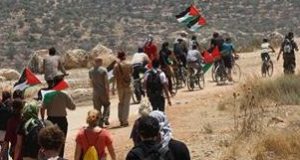Three stories from Israeli and international press follow:
Haaretz: “No more hitching in the West Bank”
by Amira Hass, November 23rd
The O.C. Central Command, Yair Naveh, dropped a cluster bomb early this week. He signed an order barring Israeli citizens from taking Palestinian passengers in their Israeli vehicles within the West Bank. The order will take effect on January 19, 2007 and it exempts those who take Palestinians with permits to enter Israel and the settlements, or those who take their first-degree relatives with them.
The reason for the new order, as noted in the IDF Spokesperson’s announcement, is of course, security: to impede those who want “to perpetrate terrorist attacks on the home front of the State of Israel and in the Judea, Samaria and Jordan Valley regions.” Therefore, the order sounds like a standard IDF shell whose objective is “self-defense,” but in practice it is another component in the regime of national and ethnic separation that exists in the West Bank, a regime of privileges for the Jewish settler minority, at the expense of the Palestinians’ individual and national rights. Like other military orders and Knesset laws, which are cleverly cloaked in the guise of the security argument, this order, too, sheds cluster bombs that will continue to destroy the remaining chance of establishing Peace-relations with the Palestinians.
The security argument will satisfy the vast majority of Israelis, just as they are content with the security explanation for hundreds of road closures and dozens of military checkpoints inside the West Bank. The fact that these limit mobility to a minimum and separate between a village and its lands, one village and another, a village and the city, and from one district and another, that is, disrupt the normal life that it is still possible to maintain under the Israeli occupation regime, never deterred the army commanders who formulated the orders, never stopped the High Court of Justice judges who approved and continue to approve the orders, and it never bothered the Labor party’s MKs. Most of the Israeli public is also not troubled by the fact that it is precisely the checkpoints and roadblocks which serve the Israeli colonization policy; they are dissecting the occupied West Bank into small and disconnected enclaves where Palestinians live, surrounded by an ocean of settlement momentum and Jewish territorial contiguity.
The ban prohibiting Israelis from taking Palestinian passengers in their cars within the West Bank is part of the regime of “transportation separation” Israel has created in the West Bank. The ban complements another order that bars Palestinians with permits to enter Israel from using those crossing points from the West Bank to Israel where Israelis pass through. The Palestinians have separate crossing points. The ban is in addition to the two separate systems of roads the security establishment continues to build unhindered in the West Bank: one for the Jewish settlers and those affiliated with them (and, by accident, for the opponents of the Occupation and Israeli Arabs, as no order against their using it has been issued yet) and the other for the Palestinians. One is spacious, lit up, safe and allows for quick and brief travel. The other is narrow, exhausting, not in good shape and full of checkpoints, and makes the travel slow and time-consuming.
This is the hierarchy that is in effect embedded in “the settlement enterprise” – improved infrastructure for the Jewish residents and constant expansion and development, as opposed to decreasing the Palestinians’ space and preventing its development. The new order follows an order that already bars all Palestinians from traveling and remaining in the Jordan Valley, a third of the West Bank’s area, and the policy of “differentiation” Naveh frequently uses: the sweeping ban on all residents of the northern West Bank, or alternately those aged 16-35, from traveling south, within the West Bank. This theft of time and space from the Palestinians is vital for ensuring that “their separate development” will always lag behind Jewish development, will always flounder on the brink of a weak, inferior and degrading existence.
The new order will not hinder “terrorist elements” from linking up with car thieves with good knowledge of the country’s hidden paths, who infiltrate into the West Bank in stolen Israeli vehicles; it will not stop them from attaching stolen Israeli license plates to their cars, forging documents, dressing up as Israelis or abducting Israelis. The real aim of the order is to attack civilian targets, targets of peace. The ban on Israelis taking Palestinians in their cars affects the rights of Israelis (Jews and non-Jews) who have Palestinian friends: they won’t be able to travel together in the West Bank, visit friends together, to help them get to the doctor, their home or their olive groves more quickly.
The ban affects all the determined Israeli groups working against the occupation: Mahsom Watch, Yesh Din, Activists against the Separation Fence, Rabbis for Human Rights, Ta’ayush, the Committee Against House Demolitions. It also affects human rights groups such as Hamoked – the Center for the Defense of the Individual, B’Tselem, and the Association for Civil Rights. Activists from all the above organizations and movements meet with Palestinians, travel with them and build up friendships with them. In their meetings and joint travels on the roads of the West Bank, they serve as a reminder to the Palestinians that there are Israelis who are not soldiers and settlers, that there are Israelis who oppose the regime of privileges and that therefore, there is perhaps hope for a fair political solution.
Naveh’s order, if it is not rescinded in time, leaves behind countless little cluster bombs that will detonate and damage this hope as well.
*****************************************************
International Herald Tribune: “Human rights lawyers asking military to rescind latest ban on Palestinian travel”
by Associated Press
RAMALLAH, West Bank: Israeli human rights lawyers said Thursday they have asked the military to overturn the latest restriction on Palestinian movement — a ban on Palestinians riding in cars with Israeli license plates in the West Bank.
The army has cited security reasons for the ban, which is to go into effect in January.
However, human rights activists said the order is part of a wider Israeli scheme to create separate road systems for Israeli settlers and Palestinians in the West Bank and to keep Palestinians from 20 percent of the territory. The restrictions will also hamper the work of humanitarian organizations in the Palestinian territories, the activists said.
“This is a part of a network of orders that creates the physical and legal reality of separation between ethnic groups present in the West Bank,” lawyer Michael Sfard wrote on behalf of the Israeli rights group Yesh Din to Israeli Defense Minister Amir Peretz. “This is exactly how apartheid is defined.”
Cars owned by Israelis and West Bank Palestinians have different plates, black on yellow and green on white, respectively. West Bankers have always been barred from driving cars with Israel plates, but until now could ride in them as passengers. Under the new order, that would be forbidden, even in the West Bank.
The army said in a statement that militant groups have exploited travel in Israeli cars to carry out attacks in Israel and against Israeli settlers in the West Bank. The military refused to elaborate.
Exempt from the ban will be Palestinian medical staff, those with permits to work in Israel, Palestinians who work for international organizations and first degree Palestinian relatives of Israelis riding in the same car, the army said. Others would have to apply for permits.
Yesh Din, a watchdog group tracking settler violence against Palestinians, is expected to challenge the ban in Israel’s Supreme Court.
The group said its work will suffer because the travel ban will make it much harder for Palestinians to file complaints against settlers with police, at a time when many area already frightened to do so.
Lior Yavneh, research director of the group, said that last year, 299 Palestinians filed complaints at Israeli police stations in Jewish settlements in the West Bank. Many reached the police stations by riding with rights workers in Israeli cars to reach the settlements that are usually off-limits to Palestinians.
Charles Clayton, national director of World Vision, an aid group that helps about 200,000 Palestinians in the West Bank, also objected to the ban, saying it would keep apart Israeli and Palestinian staff, as well as hundreds of Palestinian volunteers, who routinely travel together to help develop small businesses and agricultural projects.
“Humanitarian work is not about treating people as some sort of distant customer. These are people we have to deal with and meet with and help. How can we do that at arms length?” he asked.
Palestinians can apply for the relevant permits, but receiving them is far from automatic and requires a time-consuming and nerve-racking process, according to those who have tried the system.
Most aid groups prefer to use Israeli vehicles to move in the West Bank because Palestinian vehicles are often held up at roadblocks, doubling and tripling travel time.
Palestinian motorists are already banned from or are unable to reach more than three dozen roads and road sections in the West Bank, according to a 2004 report by the Israeli human rights group B’tselem.
“It’s all done in an incremental way, which in the grand scheme of things creates an alternative road system for Palestinians,” said Sarit Michaeli, the B’tselem spokeswoman.
The military has also restricted Palestinian access to about 20 percent of West Bank territory, including areas near Israel’s separation barrier in the West Bank and much of the Jordan Valley.
*******************************************
Haaretz: “Travel ban on Palestinians in Israeli cars limited to Green Line”
by Amira Hass, November 26th
The ban on allowing Palestinians to ride in Israeli cars in the West Bank will mainly be enforced near the border with Israel, and not throughout the West Bank, a senior Israel Defense Forces officer told Haaretz.
The officer said that he himself gives rides to Palestinians, and that he personally would not bother enforcing the rule as long as it is clear that the ride was “ordinary” and that the destination was not inside Israel.
The officer acknowledged that the ban, instituted by GOC Central Command Yair Naveh, does not “sound good,” but insisted that it was meant primarily to prevent illegal Palestinian entrants from being smuggled into Israel in Israeli cars, whose occupants are usually checked less carefully.
The order was issued, he said, to foil a trick that Israelis who smuggle Palestinians into Israel have discovered in order to evade the prohibition on doing so: Because many checkpoints are not built exactly on the Green Line (which separates Israel from the West Bank), these Israelis could take their Palestinian passengers through the checkpoints and then let them off a few hundred meters later – still in Palestinian territory, but with easy access to Israel – without breaking any laws.
However, the Yesh Din organization has asked Defense Minister Amir Peretz to overturn the rule, arguing that it, like several other orders approved by Naveh, creates a legal mechanism of separation on the basis of national origin in the West Bank. As a result, they said, it is clearly illegal, and “constitutes an international crime, the crime of apartheid.”
A statement abut the new policy issued by the IDF Spokesman’s Office last week said it was intended to fight terror rather than merely reduce the number of illegal entrants.
The senior officer explained that the order was clearly aimed at this as well, but that the number of illegal entrants seeking work is much greater than the number of terrorists.
 International Solidarity Movement Nonviolence. Justice. Freedom.
International Solidarity Movement Nonviolence. Justice. Freedom.



